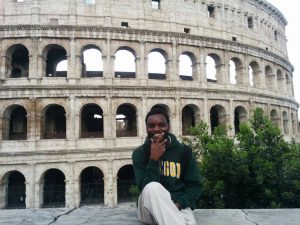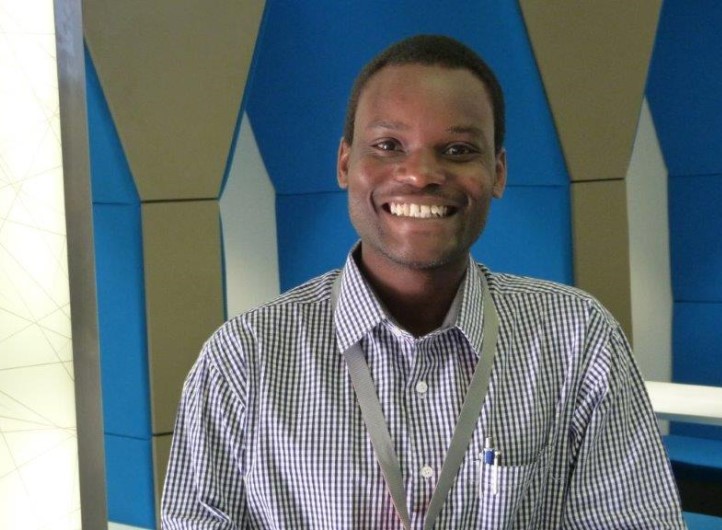We are pleased to introduce you to our latest IAMAT Scholar, Dr. Paul Yonga.
Paul is an infectious and tropical disease physician based in Eldoret, Kenya. He was awarded the 2019 IAMAT Violet Williams Travel Medicine Scholarship to train with the South African Society of Travel Medicine (SASTM) and participate in clinical observations at the Travel Doctor Clinic in Johannesburg.
IAMAT Scholarships provide training in travel medicine to practitioners who are passionate about improving care for local patients and travellers in their community. Our Scholarships strive to increase the capacity of local health services so that everyone has access to safe and reliable healthcare, no matter who or where they are.
We caught up with Paul to learn more about his scholarship experience and his plans for expanding the practice of travel medicine in Kenya.
Why train in travel medicine?
The North Rift region of Kenya, where Paul works, hosts a number of local and foreign tourists. It’s home to many of the country’s top athletes and athletic training centres, and tourist attractions such as hot springs, wildlife sanctuaries, nature reserves, and museums. Despite this, there is no travel medicine clinic in the area. As Paul says, “the knowledge, let alone the practice of travel medicine is limited, since travel medicine in Kenya is only known to be about the administration of vaccines”.
Paul is one of the few doctors in Kenya focused on travel medicine – through his practice he sees a number of inbound travellers who become ill as well as Kenyan travellers who require medical attention after their trip abroad. To improve the care he provides to his patients at Fountain Healthcare Clinic, he decided to pursue formal training in travel medicine.
Paul also works at the Baringo County Referral Hospital. There, he leads the clinical care of patients presenting with various infectious diseases such as hepatitis, drug-resistant tuberculosis, human papilloma virus (HPV), and HIV. Paul also coordinates care for visceral leishmaniasis, a parasitic infection transmitted through the bite of infected sandflies.
Training in Johannesburg
Paul took a 5-day intensive travel medicine short course sponsored by the South African Society of Travel Medicine and accredited by the University of Witwatersrand. During this time, Paul says he enjoyed expanding his existing knowledge of travel medicine and “learning completely new concepts, such as high-altitude medicine, dive medicine, the psychosocial aspect of travelling, and issues such as dental health in travellers”.
Paul then completed two days of clinical observations at the Travel Doctor Clinic where he saw travellers with vastly different itineraries: “I was able to see how a pre-travel consultation takes place, both among travellers heading out for meetings and staying in five star hotels, as well as those going out on excursions and camping”.

Travel medicine consultations are complex and involve a thorough risk assessment that considers each individual patient’s destination, itinerary, type of travel, and health status. The scholarship training focused on the importance of providing a comprehensive pre-travel and post-travel consultation, which Paul says he will be incorporating into his practice.
“Following this course, there will definitely be a change in how I take a travel and occupational history in patients who present to the consultation room or [are] admitted with various ailments. The travel history will be more detailed, whereby in those patients with a positive history of travel, where they travelled to, where they spent most of their time during the day and what they were doing, and whether any risk reduction measures were considered during the course of their trip”.
Paul summarizes his experience noting that “the scholarship has helped me immensely in broadening my knowledge and expertise in travel medicine, and it has equipped me with the confidence and skills to independently practice as a travel medicine specialist in Kenya”.
Expanding travel medicine in Kenya
After completing his travel medicine training, Paul successfully established the North Rift region’s first travel medicine clinic.
The clinic is run out of the Fountain Healthcare’s Tropical/Travel Medicine and Infectious Disease Centre (FOTROMID), which, as Paul describes, “provides pre-travel consultation and assessment services, as well as provision of the required vaccinations and travel health kits”. The clinic is also capable of providing all clinical services in general infectious diseases and caring for returning travellers who require hospitalization.
Paul plans to continue expanding travel medicine services in Kenya by sharing his knowledge and training in travel medicine with other healthcare professionals. In partnership with the Association of Travel Medicine and Vaccination Services of Kenya (ATMVSK), Paul will be facilitating education sessions for local doctors interested in travel medicine.
Eventually, Paul hopes that the FOTROMID clinic will act as a training facility for Kenyan doctors interested in learning how to set up and run travel medicine services in their own workplace. The FOTROMID clinic will also act as a teaching facility for medical students from the affiliated Moi University School of Medicine, one of the largest medical schools in Kenya. Paul hopes that “residents undertaking further training in Internal Medicine and Family Medicine will be able to undertake clinical observations and experience in travel medicine at the clinic”.
Supporting future IAMAT Scholars
IAMAT Scholarships make training accessible to doctors and nurses who need it most. It’s the only program of its kind that offers scholarships to support health practitioners from emerging economies to train in travel medicine. There are limited opportunities for practitioners from countries like Kenya to practice in travel medicine since programs can be prohibitively expensive or non-existent.
IAMAT Scholars, like Paul, are dedicated leaders. Upon graduation, our scholars return to their communities to teach their colleagues and apply their new skills to improve healthcare practices in their clinics.
To learn more about IAMAT Scholarships and how you can support the next IAMAT Scholar, check out: IAMAT Scholarships.
Images provided by Paul Yonga
Article by Claire Westmacott



